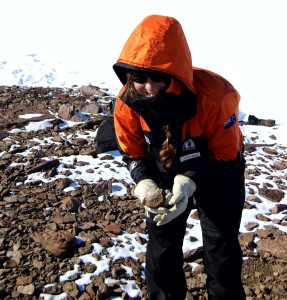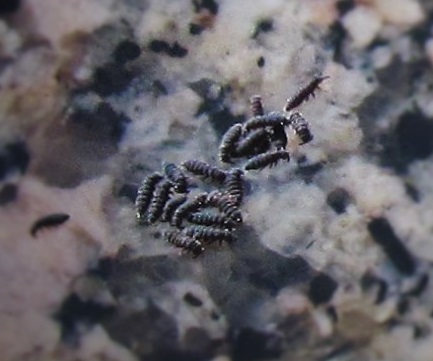Uni student turns springtail research into reward
Findings from an Antarctic expedition have earned Clare Beet a prize at an international conference.
Video by Christopher Reive
Findings from an Antarctic expedition have earned a University of Waikato student a $500 prize at an international science conference in Canada.
Clare Beet took away the NorBOL Prize for Excellence in Polar Research at the International Barcode of Life conference for a presentation on the diversity of Antarctic springtails.

Springtails are small invertebrates approximately 1.5mm in size. They are the largest land-based animal that live in Antarctica year-round and are sensitive to climate changes.
In January, Beet and three others travelled to the Ross Sea region of Antarctica to collect soil samples containing springtails. They went to a northern area that had been under-sampled.
“At many of the places we went to, it was the first time springtails had been collected there, or the first time they’d been seen since the 60s,” Beet said.
“From that we’ve found potentially three new species. Considering there’s only three species to begin with, it’s pretty significant.”
Beet said because these new genetically unique groups of springtails were found, any future changes in species’ distributions can be easily tracked through the DNA barcoding of individuals.

DNA barcoding is a scientific technique that uses a small part of a mitochondrial gene, known as co1, as a universal identifier.
“Rather than getting a springtail, for example, looking at it and, based on that visual assessment, deciding what it is, you can add some chemicals in the lab, do some processes, and then put it into the BOLD [Barcode of Life data] database online, copy a sequence into there and then boom – it tells you what it is,” Beet said.
The International Barcode of Life Conference has been running annually since 2003, and sees researchers gather to discuss and share their work. The title of Beet’s presentation at the conference was Assessing the distribution and genetic diversity of Antarctic springtails (Collembola).
Beet said it was cool to see people doing barcoding in so many different areas – from marine sponges, to Antarctic invertebrates, and Costa Rican jungle species.
The 22-year old is currently in the home stretch of her Master of Science qualification at the university, and is planning to do a PhD.
She said she’s grateful for the opportunities she has had at Waikato, but would like to go on to do her PhD elsewhere.
“I’ve done my bachelor and masters here, it’s good to go and see how other universities operate, and I’d really like to work in the Arctic,” she said.




